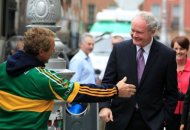Martin McGuinness, a former commander of the IRA and Northern Ireland's deputy first minister, was officially confirmed on Sunday as his Sinn Fein party's candidate for next month's Irish presidential election.
The socialist republican party's executive, the Ard Chomhairle, unanimously backed a proposal to nominate the 61-year-old, with Sinn Fein president Gerry Adams saying: "He embodies everything that is needed in a political leader."
McGuinness is expected to obtain the required support of 20 Irish lawmakers by the time nominations close on September 28. The election for the presidency, a ceremonial role currently held by Mary McAleese, is on October 27.
McGuinness will struggle to win -- Sinn Fein took just 9.9 percent of the vote in February's general elections in Ireland, and the bookmakers have ranked him third behind candidates from the ruling Fine Gael and Labour parties.
But the decision to field a Sinn Fein candidate for the presidency for the first time ever is a sign of the party's growing presence south of the border.
Despite his four years as the second most senior figure in Northern Ireland's devolved administration in Belfast, McGuinness remains controversial.
He was a leading member of the Irish Republican Army (IRA), the paramilitary group responsible for much of the violence during the three decades of sectarian violence that plagued British-ruled Northern Ireland.
However, he was also a key player in the peace process. He was viewed as instrumental in the IRA's decision to hold a ceasefire and then give up its weapons, and was a chief negotiator for the landmark 1998 Good Friday peace deal.
"When I first set out on my political journey in the streets of Derry city over 40 years ago, little did I think I would ever end up here," McGuinness told reporters at a press conference in Dublin.
McGuinness was born in the Northern Ireland town of Londonderry, a stronghold of republicanism, but he also holds a passport for the Republic of Ireland.
"I would see the presidency as being central in the unfinished business of the peace process, namely national reconciliation," between Northern Ireland and the Republic, he said.
The father of four said he had been "humbled" to be contacted by relatives of IRA victims pledging their support, adding: "This election needs to be about a new beginning. I do new beginnings."
He promised that if elected, he would draw only the average salary and donate the rest of his presidential wage to the Irish people.
McGuinness will not resign as Northern Ireland's deputy first minister but will step aside for the presidential campaign, handing over temporarily to Sinn Fein education minister John O'Dowd.
Political reaction to McGuinness's candidacy has been muted, although commentators said it promised to reinvigorate what was looking like a lacklustre race.
The socialist republican party's executive, the Ard Chomhairle, unanimously backed a proposal to nominate the 61-year-old, with Sinn Fein president Gerry Adams saying: "He embodies everything that is needed in a political leader."
McGuinness is expected to obtain the required support of 20 Irish lawmakers by the time nominations close on September 28. The election for the presidency, a ceremonial role currently held by Mary McAleese, is on October 27.
McGuinness will struggle to win -- Sinn Fein took just 9.9 percent of the vote in February's general elections in Ireland, and the bookmakers have ranked him third behind candidates from the ruling Fine Gael and Labour parties.
But the decision to field a Sinn Fein candidate for the presidency for the first time ever is a sign of the party's growing presence south of the border.
Despite his four years as the second most senior figure in Northern Ireland's devolved administration in Belfast, McGuinness remains controversial.
He was a leading member of the Irish Republican Army (IRA), the paramilitary group responsible for much of the violence during the three decades of sectarian violence that plagued British-ruled Northern Ireland.
However, he was also a key player in the peace process. He was viewed as instrumental in the IRA's decision to hold a ceasefire and then give up its weapons, and was a chief negotiator for the landmark 1998 Good Friday peace deal.
"When I first set out on my political journey in the streets of Derry city over 40 years ago, little did I think I would ever end up here," McGuinness told reporters at a press conference in Dublin.
McGuinness was born in the Northern Ireland town of Londonderry, a stronghold of republicanism, but he also holds a passport for the Republic of Ireland.
"I would see the presidency as being central in the unfinished business of the peace process, namely national reconciliation," between Northern Ireland and the Republic, he said.
The father of four said he had been "humbled" to be contacted by relatives of IRA victims pledging their support, adding: "This election needs to be about a new beginning. I do new beginnings."
He promised that if elected, he would draw only the average salary and donate the rest of his presidential wage to the Irish people.
McGuinness will not resign as Northern Ireland's deputy first minister but will step aside for the presidential campaign, handing over temporarily to Sinn Fein education minister John O'Dowd.
Political reaction to McGuinness's candidacy has been muted, although commentators said it promised to reinvigorate what was looking like a lacklustre race.




No comments:
Post a Comment